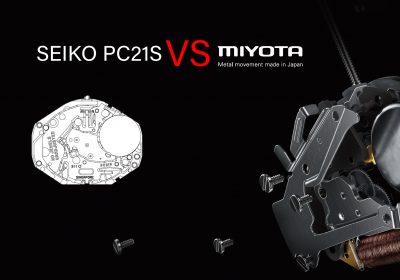When you start familiarizing yourself with watches, one word that’s going to come up a lot is “movement.” Movement encompasses not only the sweep of a watch’s hands around its face, but the way its inner mechanisms produce that effect. A watch’s movement is fundamental in how it works and keeps time — consider it the “heart” of the watch.
Watch movements come in three types: mechanical, automatic, and quartz. Below we explain the differences between them and their pros and cons.

Mechanical
A mechanical watch has a movement that’s powered by a mainspring — a coiled wire of metal — that is wound by hand. Once the mainspring is wound, it slowly and evenly unwinds, causing the second hand to move in a smooth, sweeping motion around the watch’s face. Most mainsprings are about 9-13 inches long. The longer the mainspring, the longer your mechanical watch’s power reserve, and the longer you can go between windings.
Not all mechanical movements are created equal. The attention to detail and craftsmanship that goes into a watch will determine its smoothness and accuracy.
For many aficionados, mechanical movement watches represent the crème de la crème of timepieces due to their traditional pedigree and the intricate work and engineering that must go into creating them. For these enthusiasts, owning a mechanical watch isn’t just about telling time, it’s a way to express their appreciation for history, refinement, and craftsmanship.
Pros of Mechanical Watches:
- No battery needed. Because a mechanical watch is powered by a hand-wound mainspring, you’ll never have to go to a jeweler to replace a battery. When the watch stops ticking, just wind it up.
- Smooth hand movement. For some folks, a smooth sweeping movement on the second hand is more aesthetically pleasing than the “tick tick tick” of quartz watches. If that’s important to you, go with a mechanical watch.
- Character. The engineering and work that goes into a mechanical watch is breathtaking. Inside your watchcase are tiny gears and springs that work together to give you the time. Sure, no one usually sees it, but that’s part of the charm; a watchmaker has spent hours and hours perfecting a mechanism that’s hidden from the eye. If you appreciate craftsmanship, then consider adding a mechanical movement watch to your collection.
- Tactile. For some, one of the appeals of a mechanical watch is that the owner must hand-wind it to keep it working. There’s something about the ritual of winding your watch at the end of the day that connects you more with time. There’s also something to be said for having to regularly tend to one of your possessions to keep it “alive” and ticking.
Cons of Mechanical Watches:
- Requires regular winding. While most mechanical watch mainsprings can go two days without winding, it’s recommended that you wind it once a day. As mentioned above, some folks get pleasure from this, but others find it a nuisance.
- Sensitive to the environment. Because a mechanical watch keeps time thanks to a bevy of intricate springs and gears, its movement can be highly susceptible to the environment. Moisture, dust, shocks, and magnets are the Four Horsemen of the Mechanical Watch Apocalypse. Thankfully, most modern varieties have been designed to withstand these elements, but care should still be taken. If you’re in an environment that puts you in frequent contact with moisture, dirt, magnets, and/or big bumps (like hammering or splitting wood), choose a quartz watch for daily wear and save the mechanical watch for dressier occasions.
- Not as accurate. While a well-crafted mechanical watch can keep time to 99.999% accuracy (which is about +/- 1 second a day), with age and use that accuracy starts to taper off. You’ll need to take your mechanical watch into a jeweler every 5 to 10 years for a tune-up to maintain its accuracy. What’s more, not all mechanical watches are created equal; some are more accurate than others. Finally, as mentioned above, environmental factors can deteriorate a mechanical watch’s accuracy. If strictly accurate timekeeping is your top priority, then you’ll want to opt for a quartz watch.
- Expensive. All that craftsmanship and precision engineering that goes into a mechanical watch is going to cost you extra. While there are some good mechanical watches in the sub-$500 range, most are more than that — often quite a lot more.
Automatic
Automatic watches are pretty much just like mechanical — they’re powered by a mainspring and use intricate gears to move the watch hands — but they don’t require the user to hand-wind the watch to keep it ticking. Instead, your movement throughout the day winds up the mainspring while you wear the watch. Hence, the name “automatic movement.” They’re also known as “self-winding” watches.
How does an automatic movement watch self-wind? Well, there’s a small weight inside the watch called a “rotor” that moves as your wrist moves throughout the day. It’s connected to the mainspring and winds the mainspring as it moves. Automatic watches also have a slipping clutch device to prevent the watch from getting over-wound while you’re wearing it.
If you’re not wearing your automatic watch, you’ll want to put it in a watch winder. It’s a little device that moves the watch in a circular motion while it’s stored so it stays wound. This is particularly important to do if your watch has features like a calendar or date display. For example, let’s say your automatic watch has a calendar on it, but you decide not to wear it for a few days. If you don’t store it in a winder, the power will run down and the display will get stuck on the time and date the watch stopped ticking. When you decide to wear the watch again, you’ll have to reset both.
Pros of Automatic Watches
- No battery needed.
- Don’t have to wind it by hand. If having to hand-wind a mechanical watch bothers you, but you still want the sophistication of a mechanical watch, an automatic watch is a nice compromise.
- Smooth movement. Just like manually-wound mechanical watches, automatic watches have a nice, smooth hand movement.
- Character. The same amount of engineering and craftsmanship goes into an automatic watch as a mechanical watch.
Cons of Automatic Watches
- Sensitive to the environment. The same environmental factors that can foil a mechanical watch can gum up an automatic watch.
- Needs to be stored in a watch winder when not in use. While an automatic watch doesn’t require winding if you wear it regularly, if you don’t, you’ll need to store it in a watch winder. Winders are relatively inexpensive and they don’t take up too much shelf space, but it’s one extra thing you have to buy in order to own an automatic watch.
- Less accurate. A well-crafted automatic watch can be as accurate as a well-crafted mechanical watch, but it will lose some accuracy over time and need tune-ups.
- Expensive. Same issue as mechanical watches. Craftsmanship and engineering ain’t cheap!
 Quartz
Quartz
If you’re like most average Joes, the watch on your wrist right now is probably a quartz watch. There’s a reason for that. Quartz watches are incredibly accurate and very affordable.
Instead of being powered by a wound mainspring, a quartz movement uses electricity from a small battery. The battery sends the electricity through a small quartz crystal, causing the crystal to vibrate 32,768 times per second. The vibrations are measured by a circuit, which converts the vibration into a pulse, which moves the second hand on the watch. Because quartz watches use electric pulses to move the second hand, they have a distinctive “tick tick tick” movement. It’s not as smooth as a mechanical or automatic watch.
Because quartz movements rely on electricity and fewer moving parts, they’re much more accurate and can withstand far more of a beating than mechanical or automatic watches. It’s for this reason that most “sport” and “field” watches use a quartz movement.
Quartz movements are also dirt-cheap. $4 can get you a watch that keeps time like a champ. Of course, if you want something with a bit more panache, you’ll need to spend more.
Pros of Quartz Watches:
- Accurate time. Quartz is by far the most accurate of all the movements. Will never lose or add seconds throughout the day.
- Less maintenance. Besides changing the battery every year or so, there’s little maintenance you have to perform on a quartz movement watch.
- Durable. Because they have few moving parts, a quartz watch can “take a licking and keep on ticking.” It’s not as susceptible to the Four Horsemen of the Watch Apocalypse. If you’re in a job that requires a lot of rough and dirty work, you might want to consider a quartz movement watch for everyday wear.
- Affordable. You can get quartz watches for as cheap as a few bucks. Though nicer looking ones can cost into the hundreds of dollars, they’re almost always cheaper than mechanical and automatic varieties.
Cons of Quartz Watches:
- No smooth movement. The staggered movement of the second hand on a quartz watch isn’t as smooth as that of a mechanical or automatic watch.
- Less romantic. The biggest con of quartz watches is that they lack the charm, character, and romance of mechanical watches because they lack the history, technical craftsmanship, and engineering such timepieces possess.




My brother recommended I might like this website. He was entirely right. This post truly made my day. You can not imagine just how much time I had spent for this information! Thanks! Filide Germain Josi